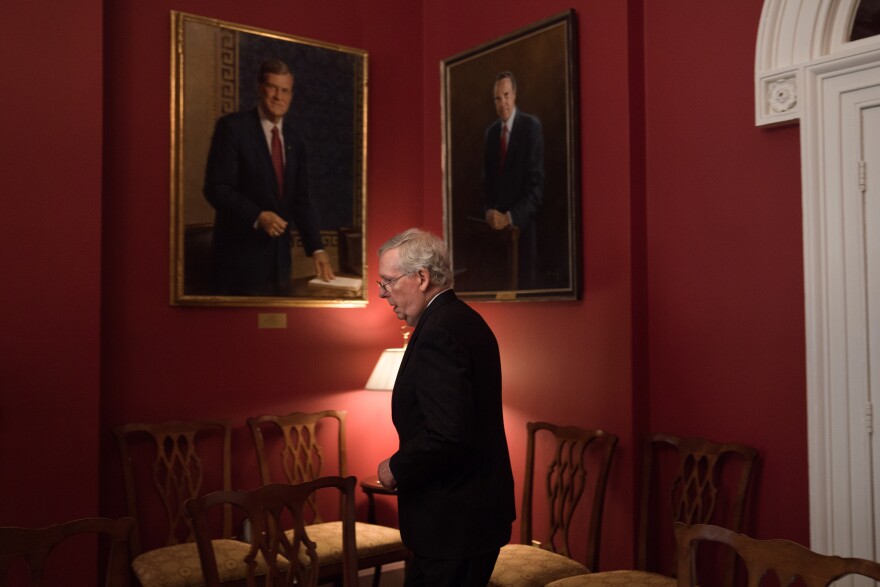Updated at 6:31 p.m. ET
Senate Majority Leader Mitch McConnell, R-Ky., told NPR in an interview that he continues to support the Mueller Russia investigation — and that nothing in Thursday's hotly anticipated secret briefing on the Russia probe to congressional leaders changed his mind.
"The two investigations going on that I think will give us the answers to the questions that you raise — the [inspector general] investigation in the Justice Department and the Mueller investigation," McConnell said. "I support both of them, and I don't really have anything to add to this subject based upon the Gang of Eight briefing that we had today, which was classified."
McConnell spoke with NPR immediately following a classified intelligence briefing from law enforcement and intelligence officials. The Gang of Eight — a bipartisan group of the four top congressional leaders and the four bipartisan leaders of the House and Senate intelligence committees — met with representatives from the Department of Justice and the FBI to discuss materials regarding a confidential FBI source who met with Trump campaign officials.
McConnell has remained the most prominent congressional Republican to defend Mueller and his investigation amid a concerted effort by Trump and conservative supporters to discredit that investigation.
The president has accused the investigation of being a partisan "witch hunt" and the investigators of being "conflicted." There is a hashtag devoted to what the president and his allies are calling "SPYGATE" that the president himself is using. Trump boasted that it "could be one of the biggest political scandals in history!"
SPYGATE could be one of the biggest political scandals in history!
— Donald J. Trump (@realDonaldTrump) May 23, 2018
The briefing and the intense conservative scrutiny of the FBI comes as lawmakers are leaving Washington for a weeklong Memorial Day recess. Members up for re-election typically use the break to campaign on the legislative successes of the first half of the year. But the Russia investigation threatens to overshadow many of those victories.
McConnell touted those successes amid fears that Republicans are at risk of losing their majorities in the House and the Senate. And he would like Trump's help selling that to voters.
"If you are a right-of-center person, there hasn't been a better period than this in at least three decades," McConnell said. "Obviously we'd like to see him talking about what we're sitting here talking about more of the time. And I think many of us have urged him to do that and we hope he will."
Also in the NPR interview, McConnell expressed confidence in Trump's decision to cancel the North Korea summit.
"I think the president did exactly the right thing," McConnell said, "because they were playing with us."

He called it a "pattern of that over the last couple of decades."
On immigration, McConnell made clear he will not push for immigration legislation. He put the ball in the House's court instead, saying, "If the House passes a bill that the president would sign, I'd be open to it."
But, he added, he is not going to allow for another open amendment process that produced no discernible results on immigration, like he did in February.
"I'm not going to do that again, I can tell you that," McConnell said.
McConnell noted that filling out federal judicial appointments is his top priority and that if a Supreme Court vacancy came up this year, he would act — despite this being an election year.
In 2016, McConnell took a very different position, refusing to bring Judge Merrick Garland's appointment to the Senate floor or even give him a hearing. He said that the new president should decide who is on the Supreme Court.
When asked if someone could argue that he should wait to make an appointment so whoever controls the Senate can make the decision — setting hearings, vetting nominees, laying out timetables — he said that would be a "foolish argument."
He did not see irony in his stance given his position on Garland because Justice Antonin Scalia died in a presidential election year.
"The presidential election is in 2020," McConnell said. "If we get a vacancy on the court this year, we'll deal with it."
Copyright 2023 NPR. To see more, visit https://www.npr.org.






